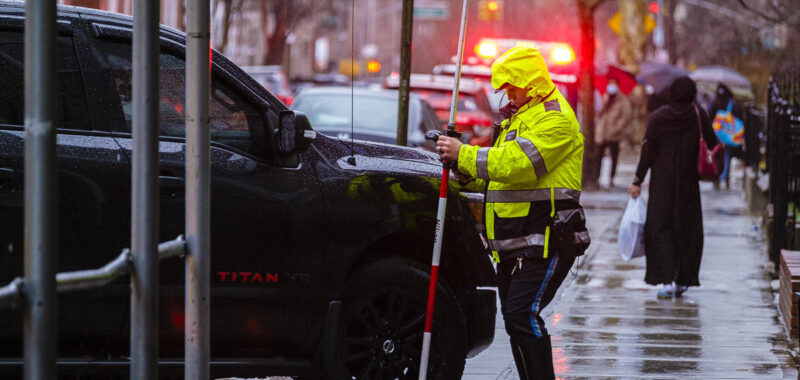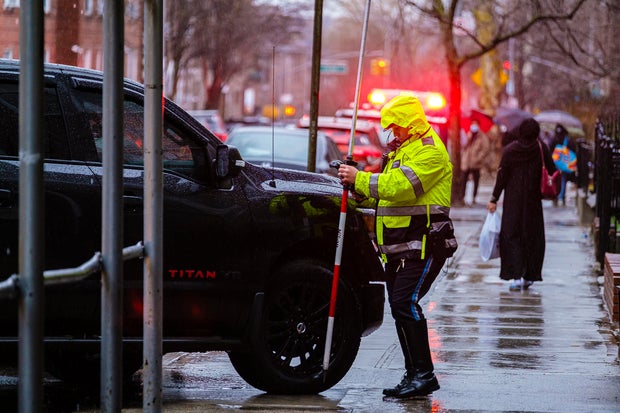Researchers at the Insurance Institute for Highway Safety who looked back at data on more than 200 vehicle-pedestrian crashes in the U.S. say Americans’ preference for large, tall vehicles is compounding the risks of serious injury to pedestrians associated with higher-speed crashes. The authors of the IIHS study conclude that the size of many American vehicles means serious pedestrian injuries are more likely in crashes when compared to the expected risks on the roads in Europe, where vehicles are generally smaller.
IIHS researchers analyzed 202 crashes involving a vehicle and at least one pedestrian aged 16 or older between 2015 and 2022 in four states, “to generate an estimate for the link between injury outcomes and impact speed,” with information about the front-end height of the vehicles being used additionally “to examine the moderating effect of” the vehicle’s size on the outcome for the pedestrians.
“A small increase in crash speed can really ramp up the danger to a pedestrian. Our fondness for tall SUVs and pickups in the U.S. has intensified that effect,” IIHS President David Harkey was quoted as saying about the study’s findings.
Jeff Bachner/NY Daily News/Getty
While it was already understood that more speed at the point of impact increases risks to pedestrians struck by vehicles, the IIHS said the new study was carried out to provide, “an updated estimate of pedestrian injury risk at different severity levels” based on the evolving design of vehicles on U.S. roads today.
“As expected, impact speed strongly predicted injury risk, and hood leading edge height significantly increased the risk of pedestrian injury overall as well as the potency of impact speed for serious injuries,” the IIHS said.
While the study found no significant change in risk to pedestrians based on the weight of the vehicles involved, the IIHS said that, “in general, higher vehicle front ends increased the likelihood of both moderate and serious pedestrian injuries.”
For example, it said that when a median-height pickup, with a front end about 13 inches higher than most cars, hits a pedestrian at 27 mph, there’s a 83% chance of moderate injury and a 62% chance of serious injury, compared to 60% and a 30% respectively if the vehicle involved in the crash is a median-height car.
“Although SUVs are a growing share of the market in Europe, the passenger vehicle fleet there has long been dominated by cars. In contrast, the majority of passenger vehicles on U.S. roads today are SUVs or pickups,” IIHS senior statistician Sam Monfort, the lead author of the study, was quoted as saying by the institute. “These choices have very real consequences for pedestrian safety.”
“Speed increases have a more pronounced effect when taller vehicles are involved” in a crash, the organization said. “For example, as crash speed increases from 15 mph to 35 mph, the risk of a serious injury goes from 9% to 52% when a median-height car is involved. With a median [height] pickup, the risk shoots up from 11% to 91%.”
Previous research by the IIHS published in 2022 found that drivers of bigger vehicles were more likely to hit pedestrians while making turns than drivers of cars, and another IIHS study published last year that pickups, SUVs and vans with hoods higher than 40 inches at the front edge were about 45% more likely to cause pedestrian fatalities in crashes than cars and other vehicles with lower, sloping hoods.
Despite the concern over the impact of larger vehicles in U.S. pedestrian crashes, however, data showed 2023 saw the first overall year-on-year decline in pedestrian deaths from vehicle accidents in about four years, since the COVID-19 pandemic. The number of pedestrians killed on U.S. roads in 2023 dropped 5.4% compared to the previous year — which saw a 40-year high — but it was still 14.1% higher than the number of deaths recorded in 2019, before the pandemic, according to the Governors Highway Safety Association.


